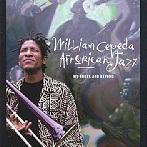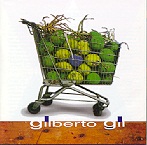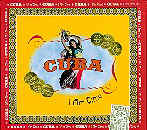






New Reviews: June 4, 1999
Blue Jackel is a relatively new label that in the short time of its existence has managed to line up an impressive roster of artists from Brasil and Cuba. And a wide range of Latin music at that -- from the traditional, Native stylings of  female vocalist Marlui Miranda to the horns and brass of William Cepeda, who combines African, jazz, and Latin influences in his music. In fact, the motto of Blue Jackel is "where Jazz and World Music come together," and is evident on
female vocalist Marlui Miranda to the horns and brass of William Cepeda, who combines African, jazz, and Latin influences in his music. In fact, the motto of Blue Jackel is "where Jazz and World Music come together," and is evident on  many of the label's current releases. There is the singer/songwriter Gilberto Gil, known for his lyrics backed up by unique instrumentation, and the percussion of Tony Mola.
many of the label's current releases. There is the singer/songwriter Gilberto Gil, known for his lyrics backed up by unique instrumentation, and the percussion of Tony Mola.
 Then there is Dissidenten (German for "The Dissidents"), an internationally-renowned collective of musicians who make music that can only be described as World Beat -- electronic, Arabic, Native American, North Indian -- there is al ittle bit of everything.
Then there is Dissidenten (German for "The Dissidents"), an internationally-renowned collective of musicians who make music that can only be described as World Beat -- electronic, Arabic, Native American, North Indian -- there is al ittle bit of everything.
 Listeners who are new to Cuban and Brasilian music would definitely want to check out two incredible boxed sets, Cuba: I Am Time, which contains four CDs enclosed in an attractive cigar box and is accompanied with a 112 page book on the history of Cuban music.
Listeners who are new to Cuban and Brasilian music would definitely want to check out two incredible boxed sets, Cuba: I Am Time, which contains four CDs enclosed in an attractive cigar box and is accompanied with a 112 page book on the history of Cuban music.  Brasil: A Century of Song also has four CDs and a 48 page color book which tells the story of Brasilian music drawing up on the most popular music styles from that part of the world -- samba, choro, and forró.
I recently asked label president and founder Jack O'Neil about the origins of the label, what is happening now, and what the future will hold.
Brasil: A Century of Song also has four CDs and a 48 page color book which tells the story of Brasilian music drawing up on the most popular music styles from that part of the world -- samba, choro, and forró.
I recently asked label president and founder Jack O'Neil about the origins of the label, what is happening now, and what the future will hold.
Paula: What is your involvement with Blue Jackel?
Jack: I am president of Blue Jackel. I started Blue Jackel about 4 years
ago. I have been involved with musical most my whole life. Before
working on the label side I was a professional musician (Tenor & Soprano
Saxophones). I was lucky enough to play with many people all over the
world. From 1985-1992 I was co leader with Al McDowell (Bass with
Ornette Coleman's Prime Time Band for over 20 years now) in a group
called Timepiece. We have two releases out on the Gramavision
Label-Timepiece and Messiah. When the band broke up I was hired to start
and develop a world music label. After 5 years I was given the
opportunity to start my own label.
Paula: What are your goals with Blue Jackel?
Jack: The artistic goals of Blue Jackel I guess can be summed up this way.
We are involved with artists that understand the traditional music from
their countries but push the artistic envelope so to speak by using
their knowledge of traditions to create contemporary music. What results
we hope is music and sounds new, yet rooted in tradition.
This also applies to what we look for in an artist. I also look
for artists that understand what they need to do in a studio. An artist
that knows what sounds he is looking for out of each instrument. An
artist who can write music and incorporate all modern and ancient sounds
into a unified composition.
Paula: What current Blue Jackel releases are you particularly enthusiastic about, and why?
Jack: I have had a hand in (recording, mixing, and mastering) most of the
recordings that have come out under the Blue Jackel label in the last
two years. So I am enthusiastic about all of them for different reasons.
from Tony Mola who has one of the best bands in Salvador Bahia and gives
us what he calls traditional Orisha rhythms in a pop sound, Marlui
Miranda who is one of Brasil's main ethnomusicologists dealing with the
Amazonian tribes, William Cepeda who is 9th generation musician from
Puerto Rico and the Familia Cepeda.Working with Joyce on Astronauta was
pure pleasure, getting Mulgrew Miller and Joe Lavano to understand what
we were trying to do by adding a jazzy feel to Brasilian music and then
having it groove so well was a joy to be part of. Tony Martinez who is
from Camaguay, Cuba brings a working unit which consits of some of the
top young Cuban jazz players - Gonzalo Rublacaba, Julio Padron, Julio
Barreto, Miguel "Anga" Diaz etc. Working with Rodolfo Stroeter from Pau
Brasil is another pleasure becuase he is producing some of the finest
contemporary music coming currently out of Brasil. Rodolfo's production
of Gilberto Gil O Sol De Oslo is being hailed by many critics as one of
Gil's finest recordings. Representing Dissidenten "the godfathers of
World Beat" (according to Rolling Stone) from Europe always keeps us on
our toes, because we never now what will come across from this very
innovative band of 20 years.
Having dinner a few weeks back with Tony Mola from Bahia and William
Cepeda from Puerto Rico is a great story to tell.Each one was playing
his music and explaining the rhythms they use to the other. As it turned
out the rhythms from each country are named from the same Orisha's and
are very similiar with only slight modifications. The joy on their faces
knowing that they have common roots makes all this record industry
madness all worth while.
Paula: Your two boxed sets about Cuband and Brasilian music respectively are particularly intriguing. What went into the creation of each of those?
Jack: I can write a book about what went into each of the compilations
Brasil: A Century of Song and Cuba: I Am Time. Each production was over 2
years in listening alone.I traveled to Brasil(which I had been traveling
to since 1977 on a regular basis) and Cuba many times during these
productions. I can honestly say I probably listened to over 5000 CD's,
LP's, 78's, to figure out what I wanted to license. The licensing part
is another book.
Paula: What does the future of Blue Jackel hold?
Jack: Now that we have signed artists on Blue Jackel the future really is
helping the artists document their dreams. Sometime at the end of this
year or maybe the begining of next year there will be a 20CD boxed set
of Brasil music.
Its hard to give answers to questions like this. The new Tony Martinez
"Maferefun" took us a year just to set up and record. Besides doing the
recordings we then have to figure out how to market the releases
properly. We have our hands full but we are not bored.
Images courtesy of Blue Jackel.













 female vocalist Marlui Miranda to the horns and brass of William Cepeda, who combines African, jazz, and Latin influences in his music. In fact, the motto of Blue Jackel is "where Jazz and World Music come together," and is evident on
female vocalist Marlui Miranda to the horns and brass of William Cepeda, who combines African, jazz, and Latin influences in his music. In fact, the motto of Blue Jackel is "where Jazz and World Music come together," and is evident on  many of the label's current releases. There is the singer/songwriter Gilberto Gil, known for his lyrics backed up by unique instrumentation, and the percussion of Tony Mola.
many of the label's current releases. There is the singer/songwriter Gilberto Gil, known for his lyrics backed up by unique instrumentation, and the percussion of Tony Mola.
 Then there is Dissidenten (German for "The Dissidents"), an internationally-renowned collective of musicians who make music that can only be described as World Beat -- electronic, Arabic, Native American, North Indian -- there is al ittle bit of everything.
Then there is Dissidenten (German for "The Dissidents"), an internationally-renowned collective of musicians who make music that can only be described as World Beat -- electronic, Arabic, Native American, North Indian -- there is al ittle bit of everything.
 Listeners who are new to Cuban and Brasilian music would definitely want to check out two incredible boxed sets, Cuba: I Am Time, which contains four CDs enclosed in an attractive cigar box and is accompanied with a 112 page book on the history of Cuban music.
Listeners who are new to Cuban and Brasilian music would definitely want to check out two incredible boxed sets, Cuba: I Am Time, which contains four CDs enclosed in an attractive cigar box and is accompanied with a 112 page book on the history of Cuban music.  Brasil: A Century of Song also has four CDs and a 48 page color book which tells the story of Brasilian music drawing up on the most popular music styles from that part of the world -- samba, choro, and forró.
I recently asked label president and founder Jack O'Neil about the origins of the label, what is happening now, and what the future will hold.
Brasil: A Century of Song also has four CDs and a 48 page color book which tells the story of Brasilian music drawing up on the most popular music styles from that part of the world -- samba, choro, and forró.
I recently asked label president and founder Jack O'Neil about the origins of the label, what is happening now, and what the future will hold.